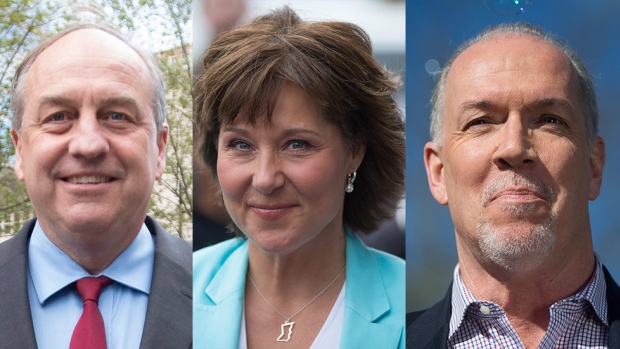May 5, 2017
B.C. election: Key economic issues on the table
, BNN Bloomberg

From the softwood lumber dispute to carbon taxes, there’s been a number of economic issues at the forefront of British Columbia’s provincial election campaign. Here’s a breakdown of the latest debates ahead of the May 9 vote.
HOUSING
The benchmark price for detached properties in Greater Vancouver stood at more than $1.5 million last May, giving rise to complaints about unaffordable homes. In response, Premier Christy Clark’s BC Liberals imposed a 15 per cent tax on foreign buyers in Metro Vancouver in August to help cool the market. The latest data from the Real Estate Board of Greater Vancouver showed a 26-per-cent decline in home sales year-over-year for the month of April, but prices were still strong with the benchmark price for all homes was $941,100, 11.4 per cent higher than the same time last year.
Clark, who won the last provincial election with a majority government, is up for re-election again, and has pledged to make housing more affordable for the middle class. Her party pledges to free up more supply and raise the First Time Home Buyers' Program exemption to $500,000. The BC NDP party, who has been the province’s official opposition party for the last 16 years, is promising to impose a levy on property speculators who don’t pay income tax in the province, while the BC Green Party wants to double the foreign buyers’ tax to 30 per cent and invest $750 million per year create more affordable housing units.
TRADE
The Trump administration’s decision to impose tariffs as high as 24 per cent on Canadian softwood exports has made its way to the forefront of the election campaign. Forestry is B.C.'s dominant resource industry, directly employing more than 60,000 people in more than 140 communities, according to the B.C. government. The United States is the province’s largest market for softwood lumber, accounting for $4.6 billion in sales last year.
Clark promises to stand up for B.C. forestry communities and work with the federal government to fight the impact of Trump’s lumber tariffs. B.C. NDP leader John Horgan told laid-off mill workers in Merritt, B.C. Tuesday that if elected, he would visit Washington D.C. within 30 days to make his case in the softwood dispute. B.C. Green Party leader Andrew Weaver called the tariffs “devastating” has attacked both of his opponents, saying his is the only party with a plan to create a prosperous future for the province.
In response Trump’s decision to slap on lumber tariffs, Clark wrote a letter to Trudeau calling on an outright ban of coal exports. She said if Ottawa doesn’t act on her request, she will impose at $70-per-tonne carbon tax on thermal coal shipped from B.C. ports. Coal is B.C.’s largest single export commodity and generates billions of dollars in annual revenue supporting thousands of jobs, according to the Ministry of Energy and Mines. Weaver said in a statement that he supports the premier's call to action and Horgan said he would use coal as a negotiating tool in his trip to Washington D.C. when discussing softwood lumber.
PIPELINES
The federal government approved the expansion of the Trans Mountain pipeline last year, but the prospect of more oil tankers in Burrard Inlet near Vancouver is controversial. The Liberals say they fought for increased environmental protections from Ottawa and economic benefits from the company behind the project. But the NDP says the environmental risks are too great and are vowing to do all they can to stop the pipeline expansion if elected. Horgan said he would raise the pipeline expansion with Canadian Prime Minister Justin Trudeau the day after the election. The B.C. Green Party opposes the project as well.
CARBON TAX
Clark has said she wants to maintain the current carbon tax of $30 per tonne until 2021, while Horgan said he would work to implement 32 recommendations that include an increase in the carbon levy to fight climate change. He also said the NDP would introduce the federally-mandated carbon price of $50 a tonne by 2022, but do it over three years, starting in 2020. The B.C. Green Party pledges to gradually increase the carbon tax by $10 a year for four years beginning in 2018.
JOBS
B.C. leads Canada in job creation and its economic growth has put it among the country’s best performers for years, but rural regions are hurting. Clark promises to invest $87 million in the B.C. Tech Strategy. Horgan pledges billions to create 96,000 jobs and restore public services, while the B.C. Greens pledge to update labour laws and promote the use of green technology.
The minimum wage has also come up as a big issue in the campaign. The NDP, backed by the B.C. Federation of Labour, is promising to increase the minimum wage to $15 an hour, while the Liberals have been implementing staggered increases that will bring the minimum wage to $11.35 an hour by September. The BC Green party pledges to form a fair wages commission that would establish a new minimum wage. The Liberals argue the minimum wage has already increased six times since 2011 and less than five per cent of workers in British Columbia earn the minimum wage.
CHILD CARE
The BC NDP is promising $10-a-day daycare based on Quebec’s system as one of the major planks in its campaign. A shortage of child-care spaces, coupled with the added strains of sky-high home prices in B.C.’s major cities, are making it difficult for young families, say the New Democrats, who believe affordable care is good for families and the economy. The BC Greens say they would offer free child care for working parents with children under three and up to $500 per month for families with children under three and a stay-at-home parent. Clark pledges to increase investment in childcare to $352.5 million.
With files from The Canadian Press








